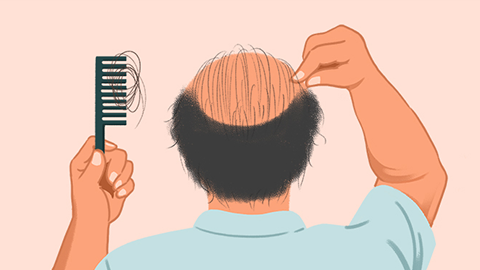How to treat seborrheic alopecia
In general, seborrheic alopecia may be related to factors such as hormonal changes during puberty, mental stress, drug side effects, malnutrition, and seborrheic dermatitis. Patients can treat the condition by adjusting their lifestyle, practicing relaxation techniques, modifying their diet, and undergoing drug therapy. It is recommended that patients promptly visit a hospital and follow medical advice for treatment. A detailed analysis is as follows:

1. Hormonal Changes: Fluctuations in hormone levels, such as during puberty, pregnancy, or menopause, may also lead to seborrheic alopecia. It is recommended to adjust lifestyle habits, maintain a healthy diet, and ensure sufficient sleep.
2. Mental Stress: Stress can disrupt the body's normal physiological balance, affect hormone levels, cause imbalances in sebum secretion on the scalp, and worsen hair loss. It is recommended to reduce stress through psychological counseling, relaxation exercises, and maintaining a healthy lifestyle.
3. Malnutrition: Deficiencies in essential nutrients, such as protein, iron, zinc, vitamin A, and vitamin D, can affect hair health and lead to seborrheic alopecia. It is recommended to adjust the diet, increasing intake of foods rich in these nutrients, such as meat, eggs, and leafy green vegetables.
4. Androgenetic Alopecia: Androgenetic alopecia is a common type of seborrheic alopecia, primarily related to the effects of androgens in the body. Women can also be affected, often accompanied by oily scalp and thinning hair. It is recommended that patients use medications such as finasteride tablets, spironolactone tablets, and minoxidil topical solution under a doctor's guidance to alleviate the condition.
5. Seborrheic Dermatitis: Scalp inflammation caused by seborrheic dermatitis disrupts the normal scalp environment, affects hair follicle health, increases sebum production, aggravates hair loss, and may be accompanied by symptoms such as scalp redness, itching, and increased scaling. It is recommended that patients use medications such as ketoconazole shampoo, mometasone furoate cream, and vitamin B6 tablets under a doctor's guidance to alleviate the condition.
During treatment, patients should adjust their diet, avoid frequent shampooing and scratching of the scalp, and perform regular scalp massages.






